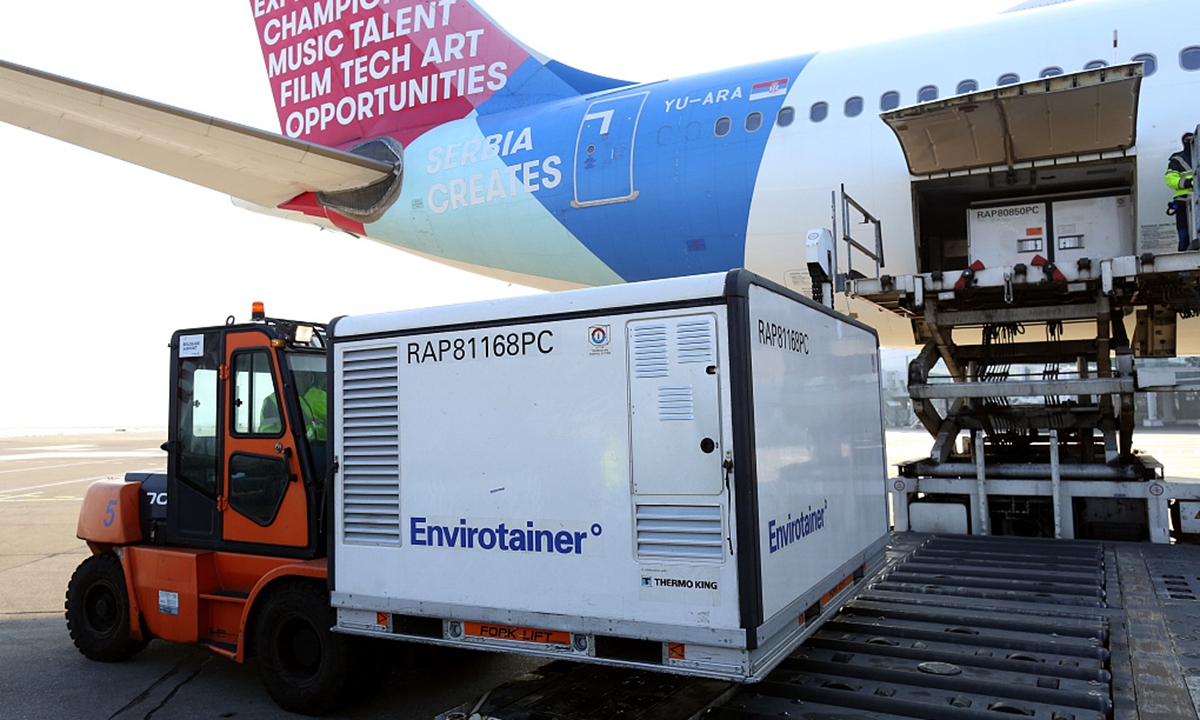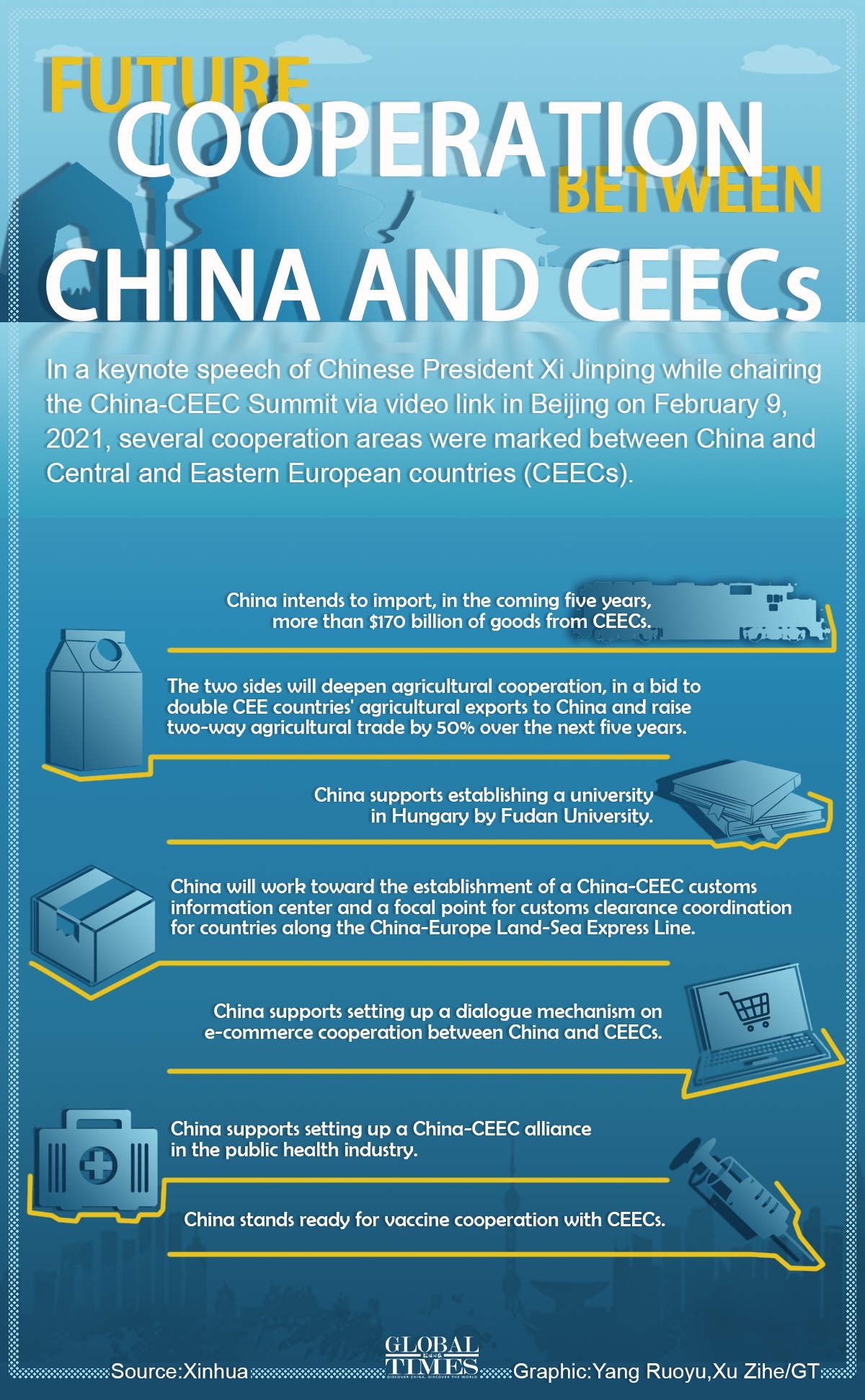
China CEEC Photo:VCG
Chinese President Xi Jinping on Tuesday lauded the cooperation between China and Central and Eastern European countries (CEECs), saying "17 plus 1 could make more than 18" at the China-CEEC Summit, which is the highest-level summit since the establishment of the cooperation mechanism.
Postponed due to the COVID-19 pandemic and China's first major host diplomatic event of the year, the summit, proposed by China, was held via video link on Tuesday and formulated the 2021 Cooperation between China and CEECs Beijing List of Activities to promote the sustainable and steady development of China-CEEC Cooperation.
Chinese analysts said the summit shows the trend of the China-CEEC practical cooperation is unstoppable and will not be affected by other factors, noting that a few countries that stir trouble won't make big waves. It also reflects the full recovery of cooperation between China and CEECs and will chart the course for economic development of the two sides in the post-pandemic era.
The summit, which comes after new US President Joe Biden took office, sent a message to the US that relations between China and CEECs will remain stable and consistent, analysts said.
Xi said China-CEEC cooperation is based on mutual respect and has no political strings attached. "All countries involved, regardless of their size, are equal partners in a cooperation mechanism featuring extensive consultation, joint contributions and shared benefits," he said.
China and CEE countries share the conviction that openness brings opportunities and inclusiveness ensures diversity. This is the key to the sustained vibrancy of China-CEEC cooperation, Xi said.
"It has developed some principles that are reflective of its distinctive features and accepted by all parties, Xi said.
"Guided by the conviction that "17 plus 1 could make more than 18", we have set up a multi-dimensional cooperation framework led by the leaders' summit and covering 20-plus sectors to ensure the participation of all CEE countries," he said.
"Mindful of each other's concerns, we have drawn up plans and decided on projects based on the national reality of each country, and encouraged all countries to find the best way to leverage their respective strengths in cooperation," he said.
According to the Beijing List of Activities, participants of the summit will continue to hold the China-CEEC National Coordinators' Meetings in 2021.
Making the summit the first major host diplomacy event of the year shows the importance China has attached great importance to European diplomacy, Liu Zuokui, director of the Department of Central and Eastern European Studies at the Institute of European Studies under the Chinese Academy of Social Sciences, told the Global Times on Tuesday.
The summit is not only a continuation of China's year of diplomacy for Europe in 2020, but also a new beginning in its efforts to promote the China-European Union (EU) comprehensive strategic partnership in 2021, Liu said.
In the last two years, China has put much effort into its diplomacy in Europe, and the country has worked to make Europe a more important partner, Liu said.
The summit reflects the improvement in bilateral trade cooperation and the closely bounded interests of China and Europe after the completion of China and the EU's negotiations over an epic bilateral investment treaty (BIT), Liu said.

Future cooperation between China and CEECs Infographic: GT
Vaccine cooperation
The summit also further promoted cooperation between China and Europe in areas, including COVID-19 vaccines.
Xi said at the summit that China will continue to provide vaccines to countries in need to the best of its capability, and do what it can to make vaccines a global public good and promote their equitable distribution and application around the world. "China stands ready for vaccine cooperation with CEE countries," he said.
So far, Serbia has received one million doses from a Chinese company, and there is ongoing cooperation between Hungary and Chinese vaccine companies. China will actively consider such cooperation with other CEE countries if there is the need, Xi said.
With several central and eastern European countries showing increased faith in China-produced COVID-19 vaccines, Chinese analysts believe that cooperation on vaccines represents a new direction and new sector for China and CEECs in the post-pandemic era.
At least six of the 17 CEECs including Serbia, Hungary, North Macedonia and Montenegro have either purchased Chinese COVID-19 vaccines for their mass inoculation campaigns or expressed an open attitude to buying them.

A woman receives a dose of the Chinese Sinopharm vaccine as the country begins mass vaccination against COVID-19 in Belgrade, Serbia, on Tuesday. Serbia is the first European country to receive and use Chinese vaccines, Serbian President Aleksandar Vucic said on January 16 while welcoming the shipment of 1 million doses of China's Sinopharm inactivated COVID-19 vaccine at the Belgrade Airport. (See story on Page 15) Photo: IC
According to the Beijing List of Activities, the participants will continue to hold China-CEEC health ministers' special meetings, health experts' meetings and other activities in a flexible manner, depending on the pandemic situation.
Also, the participants support Hungary in holding the second China-CEEC Expert Forum on Regulation of Medical Products and Medical Devices in Budapest.
Zhao Gang, Vice President of Beijing Foreign Studies University and Dean of the School of European Languages and Cultures, told the Global Times that CEEC's willingness to work with China in vaccine cooperation is based on a foundation of decades of solid cooperation and friendship between the two sides, and represents CEECs' trust in and recognition of Chinese vaccines.
Analysts believe that the vaccine cooperation between China and CEECs will help Chinese vaccines reach more European countries.
We share a common destiny with Europe in the joint fight against the epidemic, Liu said. However, he noted that some European countries still have some disagreement to our anti-epidemic measures and are reluctant to accept our medical products, so strengthening cooperation is key to promoting consensus and building a community with a shared future for human health.
If China-developed vaccines can be promoted in the CEE countries, it is conducive to enhancing China's international influence, which is also a very important part of publicizing our anti-epidemic achievements, Liu addressed.
Boost in trade
Aside from cooperation in COVID-19 vaccines and the joint anti-pandemic efforts, Xi called on China and CEECs to widen cooperation in the digital economy, e-commerce and the health sector. China supports setting up a China-CEEC dialogue mechanism on e-commerce cooperation and a China-CEEC alliance in the public health industry.
He also called for deepening cooperation with CEECs to ensure trade security and faster clearance. He said China will boost the establishment of a China-CEEC customs information center and a focal point for customs clearance coordination for countries along the China-Europe Land-Sea Express Line. China is willing to explore cooperation on a pilot basis under the "Smart Customs, Smart Borders and Smart Connectivity" Initiative.
The Beijing List of Activities said that the participants support holding the 5th China-CEEC Customs Inspection and Quarantine Cooperation Dialogue in China.
According to Xi, China plans to import over $170 billion of goods from CEE countries over the next five years, will strive to double farm product imports from CEE countries over the next five years, and aims for a 50 percent rise in bilateral agricultural trade. China is also willing to expand merchandise imports from CEE countries.
The Beijing List of Activities showed that the participants support holding various conferences, expos and forums on trade, investment, connectivity, innovation, science and technology and energy.
Data from the Chinese Ministry of Commerce (MOFCOM) showed that the country's trade with CEECs exceeded $100 billion for the first time in 2020, with an average growth since 2012 reaching 8 percent each year.
Investment cooperation continues to expand despite the global pandemic. By the end of 2020, Chinese cumulative foreign direct investment in CEEC sectors including energy, infrastructure and logistics totaled $3.14 billion, while those countries' cumulative investments in China reached $1.72 billion, according to MOFCOM.
Zhao said trade between China and CEECs is promising, following the overall recovery of the Chinese economy this year. In addition to continuously increasing China-Europe Railway Express services this year, Zhao noted that the cooperation in energy, e-commerce, digital economy and healthcare will see a rapid development.
In the past year, even in the face of such a severe pandemic, we optimized the layout of transportation, accelerated the supply of materials, and made trade rise against the global trend, Liu said.
China will have greater market access to the CEE countries, and the agricultural products and other trade products from the countries will be easier to enter the Chinese market under the Belt and Road Initiative, which will further improve economic and trade cooperation, Liu said.
With regard to global environmental governance issues, Xi said China and CEE countries should jointly implement the Paris Agreement to cope with climate change and deepen exchanges and cooperation in areas including green economy and clean energy.
According to the Beijing List of Activities, participants designated the year 2021 as the China-CEEC Cooperation's Year of Green Development and Environmental Protection. They support holding the second China-CEEC Ministers' Conference on Environmental Cooperation in China.
Under the "17+1" environment cooperation mechanism, these countries may implement more environmental protection demonstration projects to step up joint exploration of clean energy such as wind and solar, and promote green economic cooperation projects by boosting issuance of green bonds, said Zhang Hong, a research fellow at the Institute of Russian, Eastern European and Central Asian Studies of the Chinese Academy of Social Sciences.
The summit came less than one month after US President Joe Biden took office and attempted to mend relations with Europe and bring US-Europe ties closer than they were in the Trump era.
Politico reported on Friday that two Baltic countries Lithuania and Estonia confirmed that neither their president nor prime minister would attend the summit.
Estonian Minister of Foreign Affairs Eva-Maria Liimets and Lithuanian Transportation and Communications Minister Marius Skuodis attended the summit.
Chinese analysts said the new US administration is looking to form alliances that will help suppress Beijing, and the two countries yielded to US deterrence as they were concerned about national security.
Politico reported that "the Baltic states are more sensitive than most of the EU about the need for close security relations with Washington and NATO because of their concerns about the threat posed by Russia."
Analysts pointed out that the mutual interests of China and Europe are enough to resist the influence of a third party, whether it's the US or any other country.
Zhang said that Biden's speech painting China as the "most serious competitor" of the US and calling for strengthened relations with partners and allies demonstrates his ideology, which will have little impact on cooperation between China and Central and Eastern European countries. "Cooperation with China brings more material benefits to those countries than Biden's slogan," he said.


